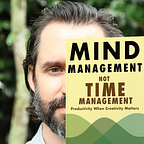Buy Information
How To Win The Battle For Our Brains
There’s a major problem with technology products today. They need eyeballs to survive.
Most apps you use throughout the day are supported by advertising, or investors are pumping it full of cash to delay the inevitable.
The metrics driving product design directed by these incentives:
- Attract more eyeballs. If you’ve monopolized all of the eyeballs, you might want to expand Internet access to the developed world, so you’ll have more eyeballs, like Facebook. (Tristan Harris)
- Increase the time the eyeballs spend. If people spend too much time driving to use your products, you’ll be incentivized to invent driverless cars, like Google. (Tristan Harris)
- Keep the eyeballs coming back. You can use Nir Eyal’s “Hooked” model to make your product habit-forming.
Unfortunately, increasing these metrics does not necessarily make a product better. It incentivizes the sensationalist, the misleading, and the addictive. It forces the hand not only of the conscienceless corporate body, but it also re-architects the labor market to favor those who will carry out these wills.
Can someone explain how, if it’s unethical for journalists to write about companies they invest in, it’s somehow ethical for them to be compensated by the pageview? (Ryan Holiday)
Does anyone (besides Ev) really believe, when a company operates under these incentives, that a switch to an algorithmic timeline is not driven to maximize revenue?
We, as consumers, should be concerned about this. It’s at least kind of our fault. We have the power to change this.
If you aren’t paying for something with money, you’re paying for it in some other way. One of the great shortcomings of our dumb brains is that we hate to pay for technology products. We’re mostly unaware of how the technology industry is eroding our collective attention the same way a mountain of iron ore would be defaced.
But that which we will spend more time on, and that which we value in a monetary sense are different things. Things that outrage people — accurate or not — will get them to spend more time, for example.
Have you recently left a movie feeling outraged? No, you paid for that movie. Hollywood knows you won’t feel your money is well-spent if you leave feeling that way.
Buy information to flip the incentives. If your favorite podcast runs a Patreon campaign, buy information. If a friend recommends a book, buy information. If a high-quality online magazine tells you you’ve run out of your quota for the month, don’t switch browsers, buy information.
At first, it will usually feel optional to buy information, but that’s just because free attracts eyeballs. That’s how we got where we are in the first place.
Companies will respond to these incentives. They’ll build products that make us better, and they’ll make information that we value. You’ll get brain nutrition, instead of brain junk food.
Buy information.
On my podcast, Love Your Work, I had a vigorous conversation with Nir Eyal about the state of digital distraction. Listen now, or subscribe on iTunes.
